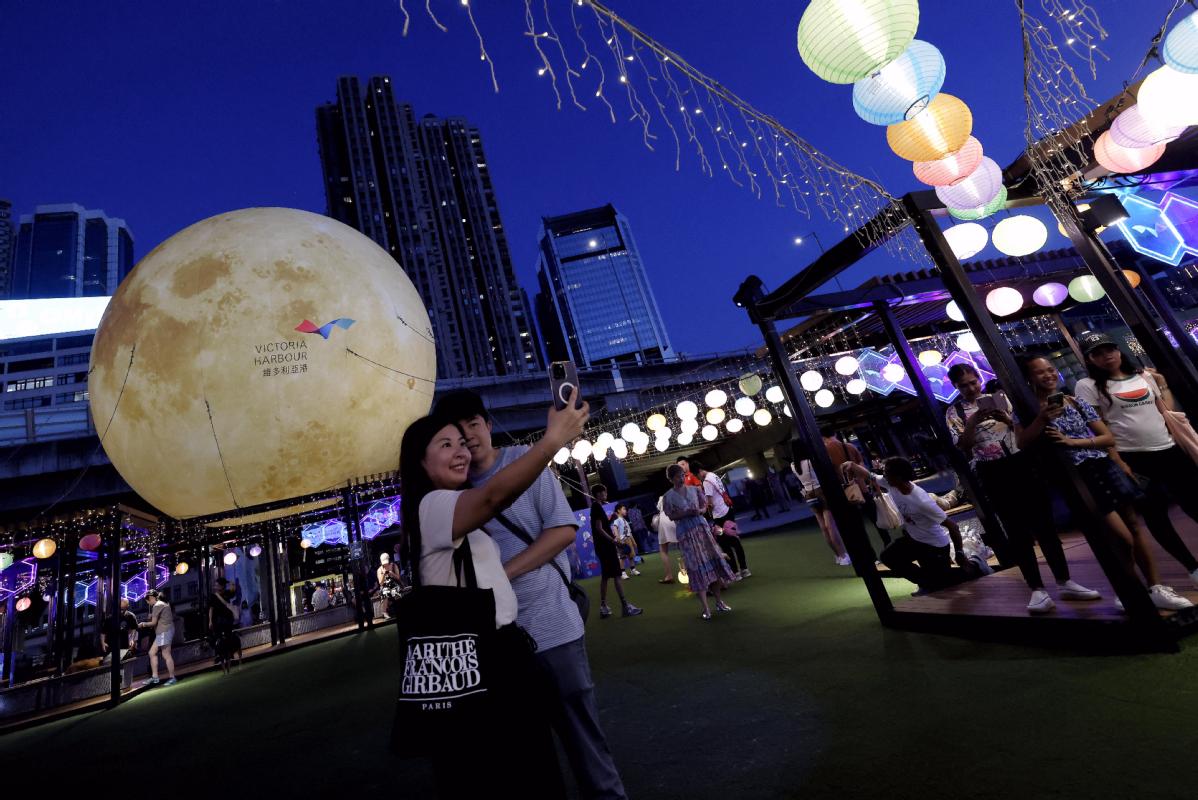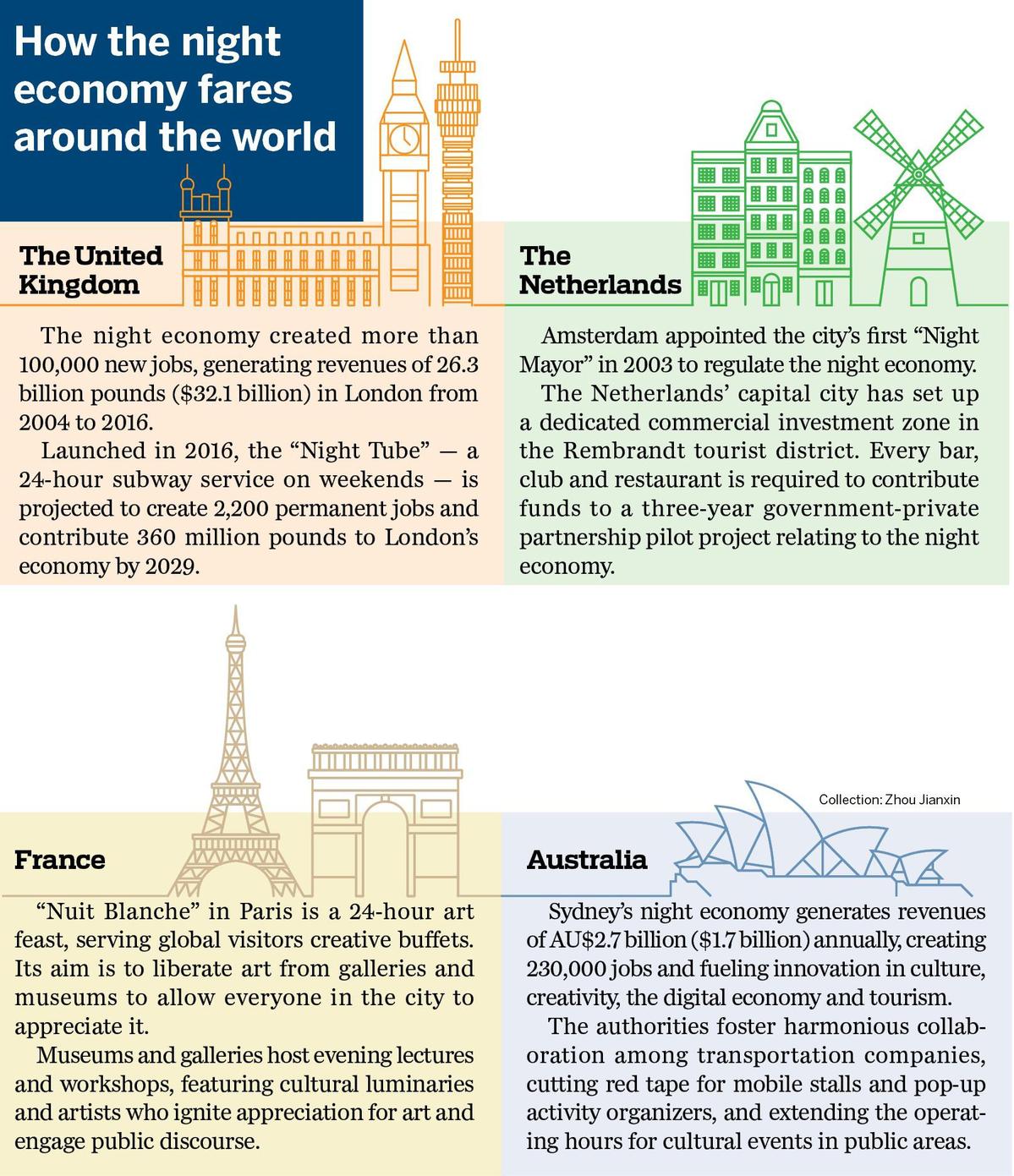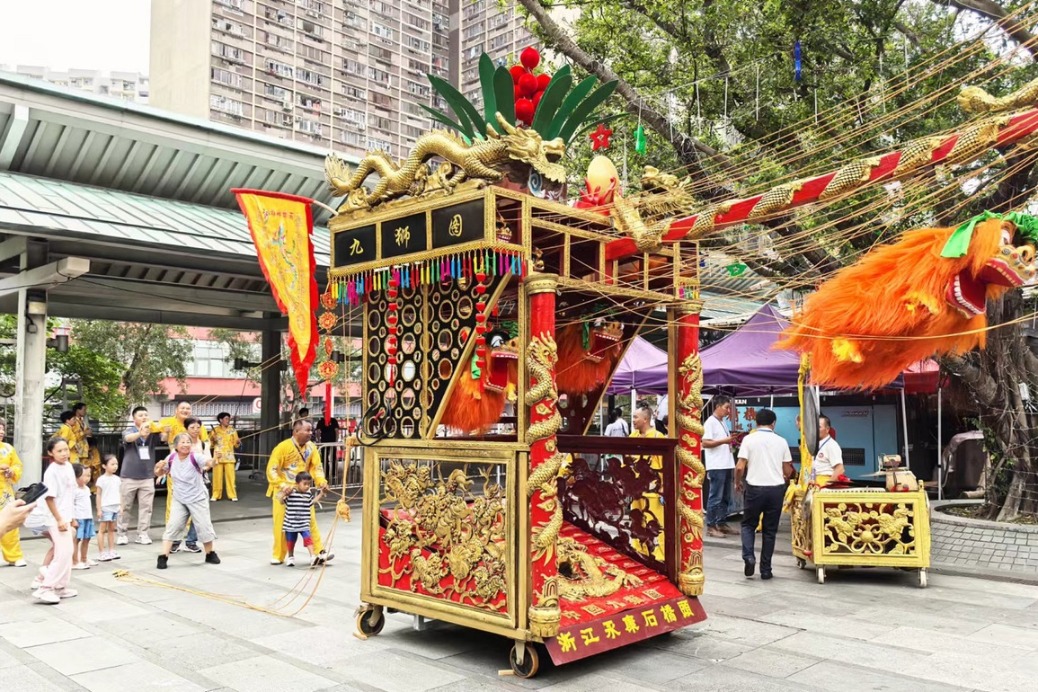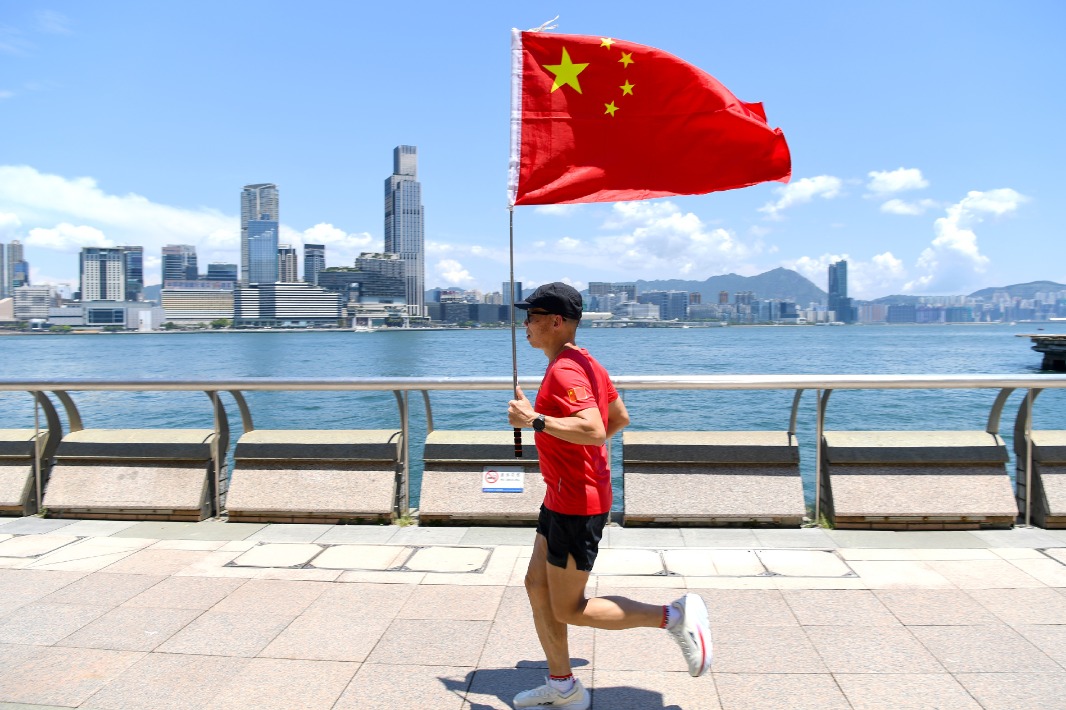The night route to Hong Kong's post-pandemic recovery


Lifting the night economy to accelerate Hong Kong's post-pandemic recovery requires a comprehensive master plan that offers a long-term sustainable development path for the industry, according to business leaders and experts. Oswald Chan and Zhou Jianxin report from Hong Kong.
Specializing in selling roasted Indonesian coffee beans and other coffee products, Daisy Mo cashed in on the Night Vibes Hong Kong campaign initiated by the special administrative region government to give a spark to the local economy, which had been severely disrupted by the COVID-19 pandemic for more than three years.
She set up a stall at the open-air market on the Avenue of Stars in the city's popular Tsim Sha Tsui tourist district, Kowloon, and was delighted with having drawn a sizable number of customers initially.
But soon, her hopes began to falter.
"The pandemic's effects on the economy still linger. Many small shops have put up the shutters, while the number of local consumers with deep pockets has gone down in recent years. Although the night economy may give tourists a fresh experience, it has not contributed much to boosting our business after more than three years of tough social distancing measures," moans Mo.
"It is crucial for small shop vendors to focus on customers who are really interested in their products and services. I am also paying higher rents here than stall owners in other markets because tourists coming to the Avenue of Stars are perceived to be big spenders," she says.

Reviving night economy
The SAR government launched the Night Vibes Hong Kong drive in mid-September - two weeks ahead of the Mid-Autumn Festival and the weeklong National Day holiday break on the Chinese mainland - to allow residents and tourists to feel the vibrancy of the city's nightlife. The campaign involves a series of entertainment, arts, culture, leisure, gourmet, music, consumption and other nighttime activities to boost the faltering local economy, with the pace of a rebound in the first half of this year not being as robust as expected.
Held at various harborfront sites, where tourists tend to congregate, the push started around the Mid-Autumn Festival holiday and will embrace several major public holidays and events through early next year, including the Hong Kong Wine and Dine Festival, Christmas, the New Year, and the Lunar New Year in mid-February.
According to official statistics, about 100,000 people had been to various night activities at three harborfront sites during the Mid-Autumn Festival and the National Day holidays.
The night economy refers to economic activities held between 6pm and 6am each day, and includes shopping, catering, tourism, entertainment, learning, films and leisure. It is seen as a major component of the urban economy in boosting consumption and creating jobs.
Hong Kong, dubbed the "Pearl of the Orient" - with its mass of glittering neon lights on both sides of Victoria Harbour, along with famed night spots, such as Temple Street and Ladies Market in Mong Kok, and Lan Kwai Fong and Soho in the Central district - has been regarded as a global pioneer and leader in the night economy since the 1980s.
But, the "pearl" has lost its luster since the COVID-19 outbreak in early 2020. Despite the scrapping of all anti-COVID social curbs since the beginning of this year, the situation has not changed significantly, with the recovery of nighttime commercial activities lagging behind those of the "day economy".
Myriad factors have contributed to the laggard recovery effort - stringent anti-COVID-19 measures had created a "stay-at-home economy"; subdued consumer sentiment arising from the recent volatility of the local equity market and sluggish property market transactions; reduced nighttime business hours due to an acute labor shortage in the retail and food-and-catering sectors; a slower-than-expected recovery in inbound tourism; and the growing trend of Hong Kong residents heading north to the Chinese mainland for dining and entertainment.
What should be the master plan to turn the tide? Economists, business leaders and lawmakers would like authorities to formulate long-term strategies, provide sufficient infrastructure, create dedicated units, play a coordinated role, and spur demand to boost the night economy.

Formulating clear strategy
Most major world cities, including London, Amsterdam, Sydney and Shanghai, do not see building up the night economy as a short-term emergency step. It should be officially incorporated into a city's development planning and the industrial economy.
"It is imperative for the government to craft a policy blueprint to develop the night economy by addressing structural issues confronting Hong Kong's service industry, such as labor shortages, quality of services, and the use of technology," says Allen Shi Lop-tak, president of the Chinese Manufacturers' Association of Hong Kong.
Regularizing night markets and injecting fresh elements into the Night Vibes Hong Kong campaign are crucial, he says. "We would like to see district officers of the Home Affairs Department taking charge of and orchestrating themed events to give each district its own unique flavor."
Cindy Keung, an economist with OCBC Hong Kong, agrees, saying it is essential for the government to formulate a clear market strategy for the night economy to reduce uncertainties for businesses. "Hong Kong should think carefully about its market position, like France's culture and exhibition-oriented model, Japan's bar-and-entertainment pattern, or the youth-focused approach in South Korea, Taiwan and Thailand."
Peter Shiu Ka-fai, the lawmaker who represents the wholesale and retail sector in the Legislative Council, says the government's bid to extend shopping malls' operating hours should not be seen as a "one size fits all" solution. "If some malls see business opportunities, they can extend their service hours and plan special activities."
Simon Lee Siu-po, an accounting and finance senior lecturer at the Chinese University of Hong Kong's School of Hotel and Tourism Management, says he believes it is crucial to choose some areas in which night economy activities can be consistently organized over longer periods.
Billy Mak Sui-choi, associate professor at Hong Kong Baptist University's Accountancy, Economics and Finance Department, suggests it is important to choose night market locations that are easily accessible for locals and tourists. In this regard, the promenade areas stretching from Hung Hom to Tsim Sha Tsui East, and from Wan Chai to Central can be explored to host night markets as they are close to major hotels, he says. For the night economy to operate smoothly, an adequate water and electricity supply, as well as other public sanitary facilities, should be provided to stalls in designated public areas.
Lee favors Sham Shui Po as an ideal place for bargain-shopping and restaurants, and the Wan Chai and Kwun Tong promenades would be suitable for creative cultural activities, and creating highlights is important to make night markets more attractive, he says. In his view, Hong Kong should inject more cultural elements into night markets, with Hong Kong cultural characteristics. "In Taiwan and some European countries, some night markets are geared mainly toward personalized and affordable cultural activities, such as sketching, silhouetting, candle-standing and doll-playing."

Coordination is the key
Experts say that, more importantly, the government should be responsible for deciding on, coordinating and managing night activities, and serving as a bridge for communication among authorities, enterprises and residents. "Running an individually owned food stall or retail shop in a designated public space may involve different government departments, such as the Highways Department, the Food and Environmental Hygiene Department, the Fire Services Department, and even the Police Force," Mak says.
He calls for the establishment of a dedicated unit to liaise with all government departments to provide comprehensive solutions for individually owned commercial facilities. "Otherwise, it might be hard for commercial operators to deal with various departments. This could force them out of business, and only large operators could benefit from the night economy, resulting in the homogenization of products or services."
"The government has to play a coordinating role, be flexible and adopt a cross-departmental approach in regulating car parking, noise pollution, and obstruction of public places associated with nighttime commercial activities. It should also streamline the compliance process and provide adequate operation guidelines for small businesses," Keung says.
Authorities should support the night economy in a sustainable manner by proactively creating more public activities consistently, Mak says. "If public activities are held round-the-clock, it would prod private developers into organizing more nighttime events and offering consumption discounts for customers, thus creating higher income for businesses."
The Chinese Manufacturers' Association urges the government to make good use of the city's mature electronic consumer voucher program and distribute "nighttime coupons" to stimulate demand among residents and tourists.
More should be done to attract residents from the Guangdong-Hong Kong-Macao Greater Bay Area to Hong Kong's night markets. "Skillfully executed night-market activities can entice them to come to Hong Kong, which has been a melting pot of foreign cultures, culinary delights, top-notch merchandise and exciting entertainment," says lawmaker Shiu. "All these would be an irresistible allure for consumers and tourists from the Greater Bay Area."
However, Lee begs to differ. He says he believes that in terms of generating business receipts, Night Vibes Hong Kong may raise market sentiment to a certain extent, but it still lags behind that of traditional festivals. His views are backed by Terence Chong Tai-leung, an associate professor at the Chinese University of Hong Kong's Economics Department. "The night economy can improve market sentiment, but it cannot lift Hong Kong's overall economy. Our main sources of economic growth are financial services and external trade. The night economy would be better for economies such as Thailand that rely heavily on tourism, but not Hong Kong," Chong says.
Contact the writers at oswald@chinadailyhk.com
- The 'running man' of Hong Kong: celebrating patriotism with Chinese national flag
- Dalian nature reserve becomes a safe stopover for migrating raptors
- US tourist's adventures at Luyuan Town in Jining
- Chongqing kicks off ethnic celebrations with bamboo ring ball match
- Two more service stations in Shanghai
- Profile: Wang Yongzhi, visionary rocket designer and manned spaceflight planner





































